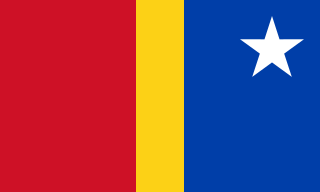Related Research Articles
Shehu Usman dan Fodio. was a Fulani scholar, Islamic religious teacher, poet, revolutionary and a philosopher who founded the Sokoto Caliphate and ruled as its first caliph.

Sokoto is a major city located in extreme north-western Nigeria, near the confluence of the Sokoto River and the Rima River. As of 2006, it has a population of over 427,760. Sokoto is the modern-day capital of Sokoto State and was previously the capital of the north-western l states. Modern Sokoto is known for trading sheepskins, cattle hides, leather crafts, kola nuts and goatskins.

The Jihad of Usman dan Fodio was a religio-military conflict in present-day Nigeria and Cameroon. The war began when Usman dan Fodio, a prominent Islamic scholar and teacher, was exiled from Gobir by King Yunfa, one of his former students.

The Sokoto Caliphate, also known as the Sultanate of Sokoto, was a Sunni Muslim caliphate in West Africa. It was founded by Usman dan Fodio in 1804 during the Fulani jihads after defeating the Hausa Kingdoms in the Fulani War. The boundaries of the caliphate are part of present-day Cameroon, Burkina Faso, Niger, and Nigeria. By 1837, the Sokoto state had a population of around 10-20 million people, becoming the most populous empire in West Africa. It was dissolved when the British, French, and Germans conquered the area in 1903 and annexed it into the newly established Northern Nigeria Protectorate, Senegambia and Niger and Kamerun respectively.

Islam is one of the two largest religions in Nigeria. Nigeria also has the largest Muslim population in Africa. In 2018, the CIA World Factbook estimated that 53.5% of Nigeria's population is Muslim. Islam is predominantly concentrated in the northern half of the country, with a significant Muslim minority existing in the southern region. Most of Northern Nigeria is governed under Sharia law, while the rest of the country is governed under secular law.

Muhammadu Bello was the first Caliph of Sokoto and reigned from 1817 until 1837. He was also an active writer of history, poetry, and Islamic studies. He was the son and primary aide to Usman dan Fodio, the founder of the Sokoto Caliphate and the first caliph. During his reign, he encouraged the spread of Islam throughout the region, increasing education for both men and women, and the establishment of Islamic courts. He died on October 25, 1837, and was succeeded by his brother Abu Bakr Atiku and then his son, Aliyu Babba.
Gidado dan Laima (1817–1842) also known as Waziri Gidado was the first known Grand Vizier of the Sokoto Caliphate, he was vizier of Sokoto during the sultanship of Muhammed Bello. He was the founder of the popular line of viziers known as the Gidado line; some of his descendants include Waziri Junaid and Abd al-Qadir (Sokoto), and in extension, Gidado Idris who was once Nigeria’s Secretary to the Government.

The Adamawa Emirate is a traditional state located in Fombina, an area which now roughly corresponds to areas of Adamawa State and Taraba state in Nigeria, and previously also in the three northern regions of Cameroon, including minor Parts of Chad and the Central African Republic.
Abdullahi Smith was a scholar of West African history and culture. He was particularly interested in Arab influence in Nigeria. Professor Smith was the first Director of Arewa House personally picked by its founder Ahmadu Bello.
Abdullahi ɗan Fodio, was a prominent Islamic scholar, jurist, poet and theologian, and the first Amir of Gwandu and first Grand Vizier of Sokoto. His brother, Usman dan Fodio (1754–1817) was the founder of the Sokoto Caliphate. Usman, being more of a scholar than politician, delegated the practical regency of the western part of his empire to Abdullahi and the eastern part to his son Muhammed Bello, who later became the Sultan of Sokoto after his father.
Abu Bakr Atiku was the third Sultan of the Sokoto Caliphate, reigning from October 1837 until November 1842.
Dr. Waziri Junaidu was a Nigerian historian, writer and one of the foremost scholars on Fulani history and the Sokoto Caliphate. He held the title of the Waziri of Sokoto.
Nana Asmaʾu was a Fula princess, poet, teacher, and a daughter of the founder of the Sokoto Caliphate, Usman dan Fodio. She remains a revered figure in northern Nigeria. She is held up by some as an example of education and independence of women possible under Islam, and by others as a precursor to modern feminism in Africa.

The Kano Emirate was a Muslim state in northern Nigeria formed in 1805 during the Fulani jihad when the Muslim Hausa-led Sultanate of Kano was deposed and replaced by a new emirate which became a vassal state of the Sokoto Caliphate. During and after the British colonial period, the powers of the emirate were steadily reduced. The emirate is preserved and integrated into modern Nigeria as the Kano Emirate Council.
The Ilorin Emirate is a traditional state based in the city of Ilorin in Kwara State, Nigeria. It is largely populated by the Yoruba-speaking people, though the kingdom is a hybrid state due to the influence of the many other tribes that make up the city.
Usman Zaki Dan Dendo was the first Etsu Nupe, the traditional ruler of the Nupe Kingdom.
The Yan Taru movement was started by Nana Asma'u dan Fodio in 1838 with the purpose of empowering and educating women in the then Sokoto Caliphate. The movement survived the death of its founder, end of the Caliphate and Colonialism in Nigeria still existing today.
Abd al-Qadir dan Tafa, also known as Dan Tafa, was a historian, theologian, philosopher, poet and jurist from the Sokoto caliphate. He was considered the "most learned" scholar of his time. He was a prolific scholar who delved into various fields of knowledge, but he was particularly renowned for his historical and philosophical writings.
Muhammad Bukhari bin Uthman was an Islamic scholar and a noted poet who was the first Emir of Tambawel. Bukhari was an important military commander who participated and led several military campaigns during the jihad of Usman dan Fodio.
References
- ↑ "Why every Nigerian should be proud of the Sokoto Caliphate — Prof Murray Last". www.premiumtimesng.com. Retrieved 2023-04-09.
- ↑ Kane, Ousmane (2016-04-21). "Arabic sources and the search for a new historiography in ibadan in the 1960s". Africa: The Journal of the International African Institute. 86 (2): 344–346. ISSN 1750-0184.
- 1 2 Ibrahim, Abubakar Adam (5 April 2015). "Prof Murray Last romance with Nigeria". Daily Trust.
- ↑ "Why "The Sokoto Caliphate" remains relevant today". www.premiumtimesng.com. Retrieved 2023-04-09.
- 1 2 Last, Murray (1967). The Sokoto Caliphate. Internet Archive. [New York] Humanities Press.
- ↑ Haushi!, Bahaushe Mai Ban (2008-01-16). "Bahaushe Mai Ban Haushi!: The Murray Last Interview". Bahaushe Mai Ban Haushi!. Retrieved 2023-04-15.
- ↑ Last, Murray (1967). The Sokoto Caliphate. Internet Archive. [New York] Humanities Press. pp. Foreword.